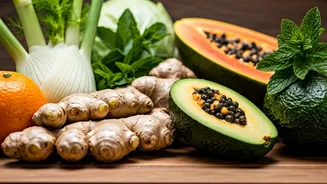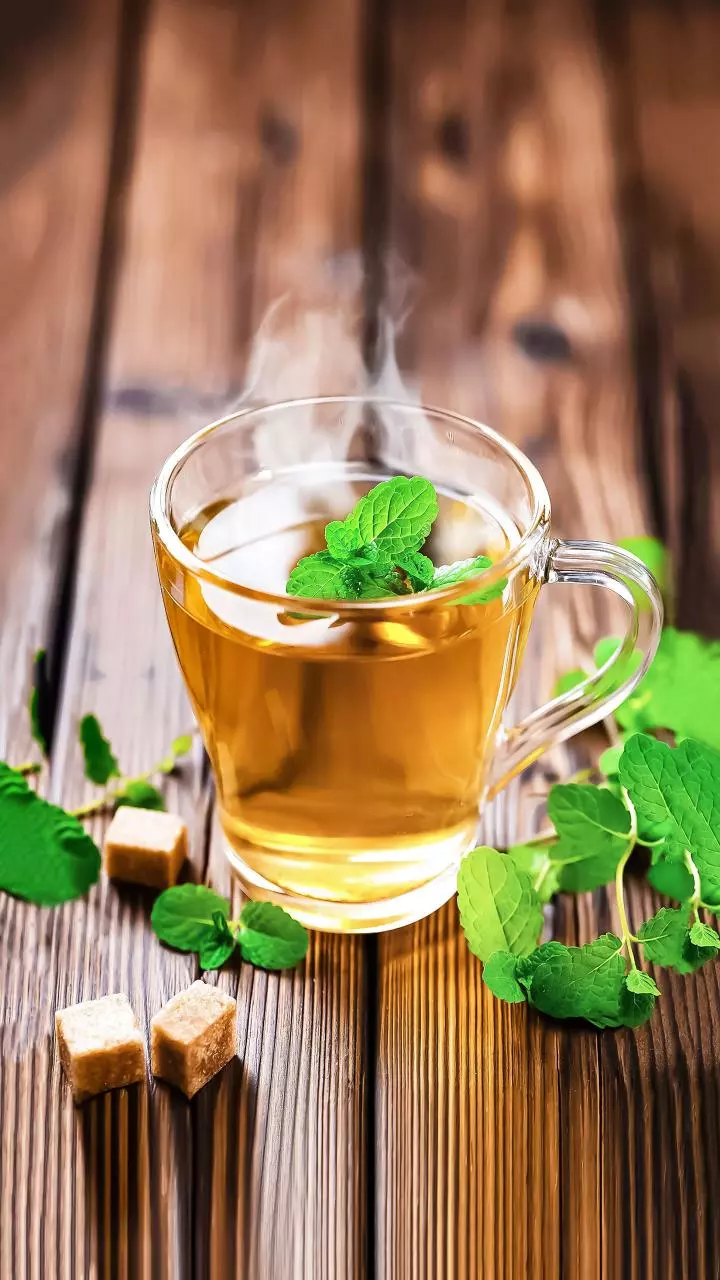Peppermint Power
Peppermint tea is a natural remedy, often praised for its ability to relax the muscles of the digestive tract. It's especially useful for reducing spasms
and discomfort caused by trapped gas. The menthol in peppermint has antispasmodic properties, which can help to ease abdominal pain, bloating, and flatulence. Furthermore, peppermint can stimulate the flow of bile, assisting in better digestion of fats, which can indirectly reduce gas production. Drinking a cup of peppermint tea after a meal is a gentle and effective way to potentially relieve bloating and gas symptoms. This can also reduce the overall occurrence of these symptoms.
Ginger's Digestive Aid
Ginger is well-regarded for its anti-inflammatory and digestive benefits. Ginger helps speed up the movement of food through the digestive tract, preventing gas buildup. It contains enzymes that help break down proteins and fats, making digestion smoother. It has been used for centuries to treat nausea and other digestive issues. Incorporating ginger into your diet can mean including it in meals, drinking ginger tea, or taking ginger supplements. This will also give you relief from bloating, as it encourages efficient digestion and reduces the chances of gas accumulating in the gut.
Fennel Seed Support
Fennel seeds have a long history as a traditional digestive aid, thanks to their carminative properties. Carminatives help reduce gas production and assist in expelling existing gas from the digestive system. These seeds contain compounds that relax the intestinal muscles, which can help reduce bloating and abdominal cramps. Chewing on fennel seeds after a meal is a common practice to support digestion and freshen breath. Similarly, fennel can be used in teas, or added to various dishes to make the food even easier on the stomach and reduce the occurrence of gas.
Papaya's Enzymes
Papaya is rich in an enzyme called papain, which is well-known for its ability to break down proteins. This can ease digestion and reduce the likelihood of bloating and gas. Papain helps the body process food more efficiently, reducing the fermentation of undigested food in the gut, which often results in gas. Eating papaya, either fresh or in the form of supplements, can be a way to improve digestive health and lessen the symptoms of gas and bloating. Regular consumption may assist in maintaining a healthy digestive system and preventing issues related to gas.
Pineapple's Bromelain Benefit
Pineapple contains bromelain, an enzyme that aids in breaking down proteins, like papain. The enzyme's properties include the ability to reduce inflammation in the digestive system. Bromelain also helps break down the complex proteins that might be difficult to digest. Bromelain can assist in the digestion process, reducing gas formation. Consuming fresh pineapple or taking bromelain supplements can improve digestion and reduce gas and bloating. This can lead to greater comfort after meals and improved digestive well-being.
Chamomile's Calming Effect
Chamomile tea has calming properties that can soothe the digestive tract and reduce inflammation, helping alleviate gas and bloating. It contains compounds that relax the muscles in the digestive system, which can reduce spasms and cramps that worsen these symptoms. Additionally, chamomile can help decrease inflammation, which improves overall digestive health. Drinking chamomile tea can provide relief from the discomfort caused by gas and bloating. This gentle approach helps calm the digestive system and encourage comfort.
Turmeric's Anti-Inflammation
Turmeric is a spice with potent anti-inflammatory properties, mainly due to its active compound, curcumin. Curcumin can reduce inflammation in the gut and can also help improve digestion. Inflammation in the digestive tract can contribute to gas and bloating. Regular intake of turmeric, either in food or supplements, can ease digestive issues. Consuming turmeric can lower gas and bloating, boosting the digestive system and overall health. Using turmeric in your diet is a flavorful way to support digestion and improve comfort.
Yogurt's Probiotic Boost
Yogurt containing live cultures, particularly probiotics, can enhance gut health. Probiotics are beneficial bacteria that help balance the gut flora and aid in digestion. A healthy balance of gut bacteria can reduce gas and bloating by improving the breakdown of food and reducing the fermentation of undigested matter. Probiotics compete with harmful bacteria, which can also cause gas. Including yogurt in your diet can improve digestive health and reduce bloating and gas. Choosing yogurts with active cultures can support a comfortable and well-functioning digestive system.
Bananas' Fiber Content
Bananas are a good source of soluble fiber, which can help regulate bowel movements and prevent constipation, a known contributor to bloating. Soluble fiber absorbs water and forms a gel-like substance in the digestive tract, aiding in smoother digestion. Bananas also contain potassium, which can help regulate fluid balance and reduce bloating caused by water retention. Incorporating bananas into your diet can support digestive health and relieve bloating and gas. Bananas are a convenient and nutritious option for promoting a healthy digestive system.
Water's Hydration Impact
Staying adequately hydrated is essential for healthy digestion and can prevent bloating. Water aids in breaking down food and transporting nutrients throughout the body, improving the digestive process. Dehydration can lead to constipation, which can increase gas and bloating. Consuming enough water helps to keep the digestive system moving smoothly, preventing the buildup of gas. Drinking an adequate amount of water throughout the day can support optimal digestion, ease bloating, and promote overall digestive wellness. Proper hydration is a simple, yet effective, way to improve digestive health.















